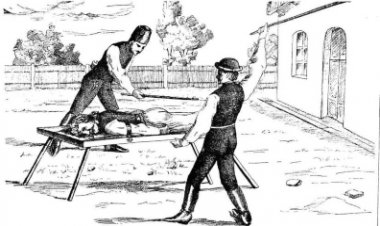Ireland stirs, EU blackmail, and farmers revolt

Sitting down with your frites? Here's your fortnightly dash of salty takes on European politics.
Have the Irish had enough? One of the many puzzles of our great continent has been the fate of Ireland. A proud country with a rich and bitter history of fighting for freedom. But under the aegis of the EU, the country has been transformed. One of Europe’s worst housing crises, an economy dangerously reliant on tax-sweetheart deals, a demographic transformation, and at the sharp end of so many initiatives to import “California values” into Europe. But over recent months, it seems like something has started to snap. Today, we read reports of mass protests against the uncontrolled, often unofficial, migration policies that have completely transformed whole areas of the country. Irish hospitality is legendary, but what has happened in recent years has made even the Irish raise serious questions. Is this movement against uncontrolled migration the start of something bigger? The last time the Irish refused to toe the EU line and rejected the Lisbon treaty in a referendum, their government was eventually bullied into submission. Here's to the Irish people making their voice heard!
EU’s Hungary blackmail attempt In an internal document aired by the Financial Times last week, EU officials outline a plan to target the Hungarian economy. From Hungary’s objections to sending EU money to Ukraine to its resistance to the woke ideology emanating from Brussels, the scandalous suggestion of economic war against Hungary suggested that EU elites have become dangerously intolerant of disagreement. The document caused (rightly) an uproar and even the EU bigwigs seemed to recognise they had gone too far. But this is not over. You might have little sympathy for Hungary’s position on transgender ideology or fully support sending more money to Ukraine (by the way, if you want to know what actually motivates Hungary on these issues, we recommend our executive director’s appearance on the EU Confidential podcast and an enlightening interview from Viktor Orbán in Le Point). But Hungary’s fight is your fight for the simple reason that if Brussels can enforce policy against one democratically elected government, there is no knowing who will be next. We have seen what happened when Greece refused to play ball. If we don’t curb Brussels’ imperial ambitions, it will happen again. Your country could be next in line.
Farmers in Arms Agriculture is a strategic sector if there ever was one. So why is it that the EU is doing everything in its power to make the lives of farming families increasingly unsustainable? Shifting the focus from food production to environmentalism, stifling those who have been looking after the land for generations with bureaucracy and ever more outlandish regulations, all in the name of sustainability. So, when Europe’s farmers leave their demanding daily routines behind, mobilise – by the hundreds of thousands, across Europe, cheered on by all segments of society in an unprecedented popular support for their cause - and travel hundreds of kilometres on their tractors to make their voice heard, it signifies something important and the elites had better take notice.
Agrarian Populism As the Financial Times reported, we were there on 24 January when French, Dutch, Irish and Flemish farmers marched on the European capital to demand a fair chance at continuing doing what they do best: put healthy, locally produced, affordable food on our tables. We were also present at the outbreak of the Berlin protests. We brought the leaders of various European farming organisations together to help them connect and realize the problem is a European one. We were there on 1 February when Belgian farmers, in solidarity with their counterparts in France and elsewhere, blocked strategic points of the country and gathered at the European Parliament. We support this movement because it is a movement of ordinary people against the elites who dictate environmentalist policy with little knowledge, and even less thought, about the consequences. Our Head of Policy, Jacob Reynolds, explained more on the Spiked podcast.
Is classical music elitist? In our last edition, we promised our upcoming event would be an exploration of why we should defend the legacy of the West in classical music. At a lively event at the Liszt Institute, we got just that. Our panellists questioned whether the supposed ‘elitism’ of classical music was actually a bad thing – given that the aspiration towards greatness is a crucial part of art as such. Indeed, we should draw a crucial distinction between our rather pathetic would-be elites (who seem fixated on apologising for the past) and the true elite of merit who bring beauty and joy into our lives. Perhaps most essentially, classical music has a subversive, transcendental nature: it lifts us out from the mundanity of everyday life. And that is precisely its value, but it only works when the music is aspirational, pointing us somewhere above and beyond. Some might call that elitism, but such dismissive attitudes have their danger. One of our panellists, Ivan Hewett, made precisely this point. Watch his full remarks on our YouTube channel.
What happened to Education? Everyone seems to be lamenting the state of Western education, but what exactly is the problem with it? Measured against the cold, hard objectivity of tests and exams, our youth is failing, rather miserably. We can put the tests aside, throw away our grading systems and declare irrelevant any possible assessment that aims to quantify achievement, while with that same momentum wipe away any remaining traces of adult authority and focus, with all our might on the emotional well-being of the child… but what good has any of this done so far? In a full day conference entitled Reclaiming Classical Education we will examine in great detail and with international experts from Hungary, the US, UK, France and Poland what precisely went wrong in Western Education and what can be done to reverse the damage. To join us for this essential discussion, register on our website.
Don’t forget to add salt! That’s it for another edition of Freedom Frites. The eagle-eyed among you might notice our refreshed MCC Brussels logo, and, if we have it our way, you’ll be seeing plenty more of it as we continue to rock the boat here in Brussels. If you want to hear more about what we do, or have a tip or suggestion, please hit reply. We’d love to hear from you. You can find the full version of this post over on our newsletter.
Frank Füredi
























